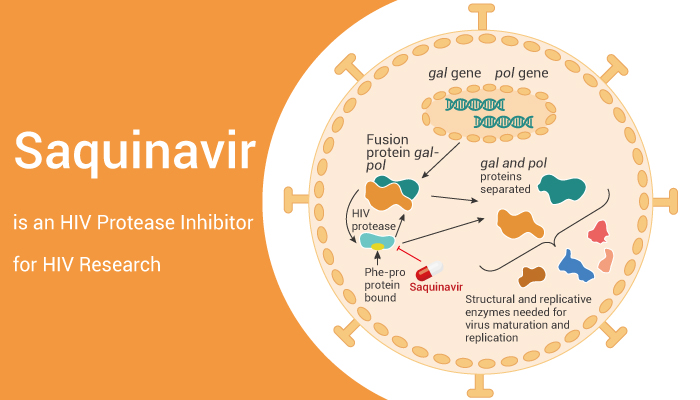HIV-1 protease is a retroviral aspartyl protease (retropepsin) that participates in the hydrolysis of retroviral peptide bonds. It is a key enzyme in the HIV life cycle, mediating the release of mature viral particles into infected cells. HIV-1 protease produces the mature protein components of HIV virions, making them infectious. Here we introduce an HIV-1 protease inhibitor, Saquinavir. Saquinavir is also a potential anticancer drug that can impair cervical intraepithelial neoplasia cell invasion by reducing MMP expression and activity.

Saquinavir is an HIV protease inhibitor with resistance to HIV infection and cancer development.
In the area of viral infections, Saquinavir is used in antiretroviral therapy. It binds to the active site of viral proteases and prevents cleavage of viral polyproteins, thereby preventing viral maturation. In in vitro experiments (PM-1 CD4 T cells, peripheral blood mononuclear cells (PBMC), monocyte-derived macrophages (MDM), and immature monocyte-derived dendritic cells (iMDDC)), it Inhibits the replication of clade B and clade C isolates of HIV-1 in a dose-dependent manner. It also inhibits the production of infectious virus in cervical, penile, and colorectal explants cocultured with T cells. Furthermore, it has an inhibitory effect on trans-infection of T cells by in vitro-derived dendritic cells and primary dendritic cells migrating from penile and cervical tissue explants.
In the field of anticancer research, cervical cancer is the leading cause of death in women independent of HIV infection. Treatment of human immunodeficiency virus (HIV) infection with highly active antiretroviral therapy (HAART) can reduce the incidence of cervical intraepithelial neoplasia (CIN) and prevent its progression to cervical cancer. Studies have found that Saquinavir inhibits CIN cell invasion, and Saquinavir reduces the expression and proteolytic activity of matrix metalloproteinases (MMP)-2 and 9 in cells. Saquinavir reduced the growth rate of CIN cells but did not affect the invasion or growth of cells derived from highly advanced cervical cancer.
In summary, Saquinavir is a highly effective HIV protease inhibitor with potential anti-infectious and anti-cancer activities.
References:
[1]. Barillari Giovannia, et al. AIDS. 2012, 26 (8): 909-919.
[2]. Martha Stefanidou, et al. Antimicrob. Agents Chemother. 2012, 56 (8): 4381-4390.
[3]. Qi Sun, et al. Signal Transduct Target Ther. 2021 May 29;6(1):212.